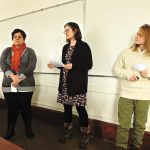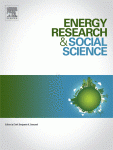

Richelle Winkler and EEP PhD student, Erin Burkett’s research was highlighted in the article “More women are fishin’–but not enough to offset the drop in men” published in Great Lakes Echo.


Richelle Winkler and EEP PhD student, Erin Burkett’s research was highlighted in the article “More women are fishin’–but not enough to offset the drop in men” published in Great Lakes Echo.
 Mary Durfee (professor emerita at Michigan Tech) and Rachael Lorna Johnstone’s (University of Akureyri, Iceland and the University of Greenland) have published a new book, Arctic Governance in a Changing World with Rowan and Littlefield.
Mary Durfee (professor emerita at Michigan Tech) and Rachael Lorna Johnstone’s (University of Akureyri, Iceland and the University of Greenland) have published a new book, Arctic Governance in a Changing World with Rowan and Littlefield.
Arctic Governance in a Changing World provides a succinct yet precise account of the contemporary Arctic in the context of international relations and international law to explain the people and processes that govern the Arctic.
The book begins with an overview of the Arctic in light of its inextricable relation to the wider world. An explanation of environmental and political change in the Arctic follows. The book shows how various players in Arctic decision-making influence different spheres of governance. Security in the Arctic is analyzed in terms of both national and human security. Arctic economies are presented and then explored from a political economy perspective, including free trade issues and the influence of China. The book is strong on human and indigenous rights and explains how these rights constrain state and corporate behavior. It shows how the law of the sea in the Arctic determines resource allocation. Unique in a textbook about international relations is a chapter on Arctic shipping. The book explains how (and to what extent) international environmental law protects the vulnerable Arctic and its inhabitants in times of climate change. It concludes with an analysis of resilient governance in the Arctic.

Roman Sidortsov co-authored an article Sustainable Cybersecurity? Rethinking Approaches to Protecting Energy Infrastructure in the European High North published in Energy Research & Social Science, Vol. 51, pp. 129-133.
 Shan Zhou recently co-authored the article Understanding Renewable Energy Policy Adoption and Evolution in Europe: The Impact of Coercion, Normative Emulation, Competition, and Learning published in Energy Research & Social Science Vol. 51, pp. 1-11.
Shan Zhou recently co-authored the article Understanding Renewable Energy Policy Adoption and Evolution in Europe: The Impact of Coercion, Normative Emulation, Competition, and Learning published in Energy Research & Social Science Vol. 51, pp. 1-11.

Congratulations to graduate student, Sophia Ford (MS EEP), who was the First Place winner in the Copper Country Community Arts Center’s community art exhibition “Shaft Series” inspired by mining heritage.

Students from Angie Carter’s Communities and Research class (SS4700) presented their semester research project at the Social Sciences Brown Bag. The project looked at food access in Houghton, Hancock, and Michigan Tech. An article on the presentation was featured in the Daily Mining Gazette.
 Erin Pischke (PhD EEP alumnus), Barry Solomon (Professor Emeritus) , and Adam Wellstead (SS) along with Alberto Acevedo, Amarella Eastmond, Fernando De Oliveira, Suani Coelho, Oswaldo Lucon recently published an article From Kyoto to Paris: Measuring Renewable Energy Policy Regimes in Argentina, Brazil, Canada, Mexico and the United States in Energy Research & Social Science journal where they investigate the central research question: How do we measure the national and subnational policy output of existing renewable energy policies in order to assess how they broadly address climate change?
Erin Pischke (PhD EEP alumnus), Barry Solomon (Professor Emeritus) , and Adam Wellstead (SS) along with Alberto Acevedo, Amarella Eastmond, Fernando De Oliveira, Suani Coelho, Oswaldo Lucon recently published an article From Kyoto to Paris: Measuring Renewable Energy Policy Regimes in Argentina, Brazil, Canada, Mexico and the United States in Energy Research & Social Science journal where they investigate the central research question: How do we measure the national and subnational policy output of existing renewable energy policies in order to assess how they broadly address climate change?
 Laura Walikainen Rouleau was quoted in the article The Glamorous, Sexist History of the Women’s Restroom Lounge in The Atlantic’s CityLab.
Laura Walikainen Rouleau was quoted in the article The Glamorous, Sexist History of the Women’s Restroom Lounge in The Atlantic’s CityLab.


Don Lafreniere and Brad Barnett presented a talk titled Geographic Information Systems (GIS): Essential Infrastructure for Economic Development at the Keweenaw Economic Development Alliance (KEDA) monthly breakfast meeting on November 7. KEDA Member Meeting breakfasts are offered monthly with different topics and presenters each month. More information about the presentation can be found at the Keweenaw Report.

Social Sciences alumni, Amy Storer is featured in The Daily Mining Gazette story, More Than Tech: Homeland Security analyst says MTU offers options. Storer recently participated in The Five Under 35 at MTU where young alumni are invited back to campus and speak about their experiences at MTU and their careers.